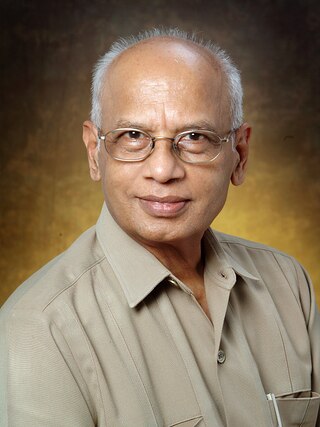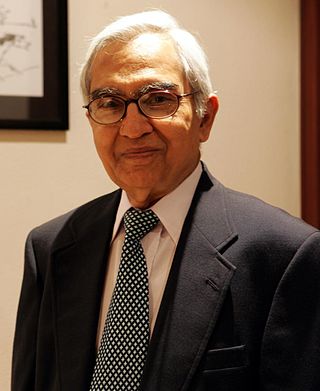Related Research Articles

Marthanda Varma Sankaran Valiathan is an Indian cardiac surgeon. He is a former President of the Indian National Science Academy and National Research Professor of the Government of India.
Bal Krishna Goyal was a cardiologist and medical educationist from India. He was an Honorary Consultant Cardiologist to the Texas Heart Institute at Houston, USA.
Sivaramakrishna Iyer Padmavati was an Indian cardiologist. She was director of the National Heart Institute, Delhi, and the founder president of the All India Heart Foundation. The institute collaborates with the World Health Organization (WHO) in training students in preventive cardiology. Padmavati was awarded India's second highest civilian honour, the Padma Vibhushan in 1992. Padmavati, an elected fellow of the National Academy of Medical Sciences, was the first woman cardiologist in India and established the first cardiac clinic and cardiac catheter lab in India.

Dr. Bhim Sen Singhal is the Director of Neurology at Bombay Hospital Institute of Medical Sciences in Mumbai, India.
Noshir Hormusjee "N. H." Wadia was an Indian physician. He was a prominent figure in the field of neurology. Wadia was given the Padma Bhushan award by the Government of India. He was also given the Certificate of Appreciation for Services to Neurology by the World Federation of Neurology in 1993. He pioneered the practice of neurology in India.

Suresh Hariram Advani is an oncologist who pioneered hematopoietic stem cell transplantation in India. Struck by poliomyelitis at the age of 8 years, the wheelchair-using doctor studied at Grant Medical College, Mumbai, following which he worked at Tata Memorial Centre for several years as a medical oncologist. Now he consults at Sushrut Hospital & Research Centre. He gained experience in the field of bone marrow transplantation from the Fred Hutchinson Cancer Research Center, Seattle, Washington.
Jitendra Nath Pande or J. N. Pande was an Indian Pulmonologist and Professor and Head of Medicine at the All India Institute of Medical Studies (AIIMS). He was working as Senior Consultant (Medicine) at Sitaram Bhartia Institute of Science & Research, New Delhi. He died on 23 May 2020 during sleep when he was home quarantined due to COVID-19 positivity during the COVID-19 pandemic in India, in New Delhi.
Stanley John was an Indian cardiothoracic surgeon, a former professor at the Christian Medical College and Hospital (CMCH) and one of the pioneers of cardiothoracic surgery in India. He is reported to have performed the first surgical repairs of Ebstein's anomaly, Ruptured Sinus of Valsalva (RSOV) and Double Outlet Right Ventricle (DORV) in India. He assisted in performing the first open heart surgery in India while working at CMCH. During his tenure of 25 years at the institution, he mentored several known surgeons such as V.V. Bashi, A. G. K. Gokhale, J. S. N. Murthy and Ganesh Kumar Mani. Later, John joined Yellamma Dasappa Hospital, Bengaluru at the Department of Thoracic and Cardiovascular Surgery. He is an elected fellow of the National Academy of Medical Sciences, and the Government of India awarded him the fourth highest Indian civilian award of Padma Shri in 1975. He served as the 13th President of the Indian Association of Cardiovascular-Thoracic Surgeons (IACTS) between 1982 and 1983.

Ranjit Roy Chaudhury, was an Indian clinical pharmacologist, medical academic and health planner, who headed the National Committee for formulating the policy and guidelines on drugs and clinical trials in India. He was the chairman of the joint programme of World Health Organization and Government of India on Rational Use of Drugs in India. He was the founder president of the Delhi Medical Council and the president of the Delhi Society for Promotion of Rational Use of Drugs.
Harpinder Singh Chawla is an Indian dental surgeon, medical researcher and writer, known for his work in pediatric dentistry. Born on 15 March 1945 to Sukhdev Singh and Iqbal Kaur Chawla in Amritsar, the temple town in the Indian state of Punjab, he graduated in Dentistry from the Government Dental College and Hospital, Amritsar in 1967. He did his post graduation in the speciality of pedodontics and preventive dentistry from the same college in 1970. He joined Institute of Medical Education and Research in 1970.He started his career as a registrar at the Post Graduate Institute of Medical Education and Research (PGIMER), Chandigarh in 1970 and worked in several capacities such as lecturer, assistant professor, associate professor and professor and is the incumbent Head of the Oral Health Science Center of PGIMER.
C. U. Velmurugendran is an Indian neurologist, medical writer and the chairman and head of the Department of Neurology at the Sri Ramachandra Medical College and Research Institute, Chennai. He is an honorary professor at the Sri Venkateswara Institute of Medical Sciences, Tirupati and has contributed chapters to books including Diseases of the Spinal Cord, published in 2012. The Government of India awarded him the fourth highest civilian honour of the Padma Shri, in 2008, for his contributions to medicine.
Khushwant Lal Wig (1904–1986) was an Indian physician, medical academic, writer and the director of the All India Institute of Medical Science, New Delhi. He was a Fellow of the Royal College of Physicians of London and a recipient of Dr. B. C. Roy Award, the highest Indian award in the medical category. The Government of India awarded him the third highest civilian honour of the Padma Bhushan, in 1964, for his contributions to the Medical science.
Puliyur Krishnaswamy Duraiswami (1912–1974) was an Indian orthopedic surgeon, medical writer and the Director General of Health Services under the Government of India. Besides being a Fellow of the Royal College of Surgeons of England and a founder Fellow of the National Academy of Medical Sciences, he published several articles on orthopedics and was a recipient of Robert Jones Medal and the Presidential Merit Award of the British Orthopaedic Association. The Government of India awarded him the third highest civilian honour of the Padma Bhushan, in 1966, for his contributions to the Medical Science.
Prem Nath Wahi (1908–1991) was an Indian pathologist, writer, medical academic and the director general of the Indian Council of Medical Research. He was a fellow of the Royal College of Physicians of London, a founder fellow of the National Academy of Medical Sciences and a recipient of Dr. B. C. Roy Award and the Padma Bhushan.
Raman Viswanathan (1899–1982) was an Indian chest physician, medical mycologist and pulmonologist, considered by many as the father of Chest Medicine in India. He was the founder director of Vallabhbhai Patel Chest Institute, a postgraduate medical institute based in Delhi. An elected fellow of the American College of Chest Physicians, Royal College of Physicians of London, Indian National Science Academy and the Academy of Medical Sciences, United Kingdom, he was a recipient of several honors including the Forlanini Medal by Italian Tuberculosis Association and the Eugeno Morelli Prize of the National Academy of Sciences, Italy. The Government of India awarded him the third highest civilian honour of the Padma Bhushan, in 1974, for his contributions to medicine.
Darab Jehangir Jussawala (1915–1999) was an Indian medical-cum-surgical oncologist, medical writer and the director of Tata Memorial Centre. He was the co-founder of Indian Cancer Society, along with Naval Tata in 1951, and the founder of the Indian Cancer Rehabilitation Centre in Parel, Mumbai, in 1956, the first such centre in India and the largest in Asia. He served as the director of Lady Ratan Tata Medical and Research Center and as the honorary consultant at two Mumbai hospitals, Breach Candy Hospital and Jaslok Hospital. An elected fellow of the Royal Society of Medicine, National Academy of Medical Sciences, Indian Academy of Sciences, Indian National Science Academy and the American College of Surgeons, he was a recipient of the Dhanwantari Award as well as several Oration Awards. The Government of India awarded him the third highest civilian honour of the Padma Bhushan, in 1975, for his contributions to Medicine.

Kewal Kishan Talwar is an Indian cardiologist, medical academic and writer, and a former chairman of the Medical Council of India. He is a former director of the Post Graduate Institute of Medical Education and Research (PGIMER) and is reported to have performed the first implantation of Implantable cardioverter-defibrillator (ICD) therapy in South Asia. He is also credited with the introduction of Cardiac Resynchronization Therapy in India. He is a recipient of several honours including B. C. Roy Award, the highest Indian award in the medical category. The Government of India awarded him the third highest civilian honour of the Padma Bhushan, in 2006, for his contributions to medicine. Presently Dr. Talwar is working in PSRI Hospital Sheikh Sarai, New Delhi as the chairman of Cardiac Sciences
David Albert Cooper was an Australian HIV/AIDS researcher, immunologist, professor at the University of New South Wales, and the director of the Kirby Institute. He and Professor Ron Penny diagnosed the first case of HIV in Australia.
Daljeet Singh Gambhir is an Indian cardiologist, medical academic, researcher and inventor and the Group Director of Cardiology at Kailash Group of Hospitals and Heart Institute, Delhi. He is the inventor of Infinnium Paclitaxel-Eluting Stent, a reportedly cheaper drug-eluting stent which he first presented at the EuroPCR meeting held in Paris in 2003. A fellow of the National Academy of Medical Sciences and an honorary fellow of the Indian College of Cardiology, he is reported to have performed over 10,000 coronary interventions. The Government of India awarded him the fourth highest civilian honour of the Padma Shri, in 2016, for his contributions to medicine.
Zarir Udwadia is an Indian pulmonologist and researcher. His work on drug resistant tuberculosis has led to improvements in India's National Tuberculosis Control Programme. Udwadia was the only Indian invited by the WHO to be part of the TB ‘Guidelines Group’, which formulated the 4th edition of the TB Guidelines, published in 2010. He was also the only doctor to be named among India's best strategists.
References
- ↑ Staff Reporter (26 March 2018). "Book highlights ancient system of medicine". The Hindu. Retrieved 16 April 2021.
- ↑ "Hospitals need to analyse antibiotic resistance among patients: Farokh Udwadia". The Indian Express. 19 December 2019. Retrieved 16 April 2021.
- ↑ "Dhirubhai Ambani critical, on life support". Indiatimes . 25 June 2002. Archived from the original on 3 May 2012. Retrieved 26 May 2011.
- ↑ "List of Fellows — NAMS" (PDF). National Academy of Medical Sciences. 2016. Retrieved 19 March 2016.